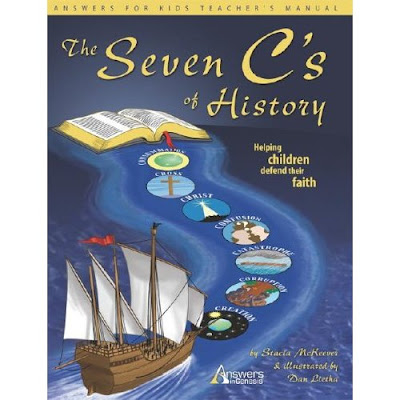The 7 C's of History
 In finishing up our expository study through Genesis 1-11, we find ourselves only in November! As previously stated in the post "Beginnings", this portion of ancient history commonly neglected in most school curricula is the foundation for the Gospel message itself. For indeed, without the fall of mankind, what need is there for a Saviour? And if mankind was not created in six days, how was there death before sin if "the wages of sin is death"? And, if the Flood was not a global judgement for sin, will the Day of Lord also be merely a local judgement on just one portion of humanity? These questions were all answered in our study through Genesis 1-11 and laid the foundation for further study. Answers in Genesis, one of my main resources for this particular portion of scripture, has created a timeline for world history. It divides time- past, present, and future- into seven specific world shaping events. It is used as the "map" at their Creation museum in Kentucky and the outline for a school/sunday school curriculum set they have created. Using their "timeline", but my own resources, I have expanded my Genesis study on "Beginnings" to include the last three C's: Christ, Cross, and Consummation. This grants us an in depth look at the life of Christ. As I am beginning with the Incarnation of Christ in late November, I was excited to realize that holidays of Christ's birth and resurrection, fit well with the plan I have to cover the life of Jesus in the latter half of the school year. Here is the outline of the Seven C's:
In finishing up our expository study through Genesis 1-11, we find ourselves only in November! As previously stated in the post "Beginnings", this portion of ancient history commonly neglected in most school curricula is the foundation for the Gospel message itself. For indeed, without the fall of mankind, what need is there for a Saviour? And if mankind was not created in six days, how was there death before sin if "the wages of sin is death"? And, if the Flood was not a global judgement for sin, will the Day of Lord also be merely a local judgement on just one portion of humanity? These questions were all answered in our study through Genesis 1-11 and laid the foundation for further study. Answers in Genesis, one of my main resources for this particular portion of scripture, has created a timeline for world history. It divides time- past, present, and future- into seven specific world shaping events. It is used as the "map" at their Creation museum in Kentucky and the outline for a school/sunday school curriculum set they have created. Using their "timeline", but my own resources, I have expanded my Genesis study on "Beginnings" to include the last three C's: Christ, Cross, and Consummation. This grants us an in depth look at the life of Christ. As I am beginning with the Incarnation of Christ in late November, I was excited to realize that holidays of Christ's birth and resurrection, fit well with the plan I have to cover the life of Jesus in the latter half of the school year. Here is the outline of the Seven C's:Seven Pivotal events from the beginning of time to the end of time
Creation
In the beginning, [in six, 24-hour days], God made a perfect creation.
Corruption
The first man, Adam, disobeyed the Creator. His sin brought death and corruption into the creation.
Catastrophe
Adam’s race became so wicked that God judged the earth with a great catastrophe- a global Flood-saving only those on the ark built by Noah.
Confusion
When Noah’s descendants disobeyed God’s command to fill the earth, God brought confusion on their language, forcing them to spread over the earth.
Christ
The Creator became a man, Jesus Christ, who obeyed God in everything, unlike the first man, Adam.
Cross
Jesus, the Messiah, died on a cross to pay the penalty for mankind’s sin against God. He rose from the dead, providing life for all who trust in Him.
Consummation
One day, at the consummation, the Creator will remake His creation. He will cast out death and the disobedient, and dwell eternally with those who trust in Him.
Comments
Post a Comment